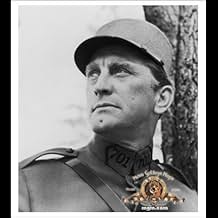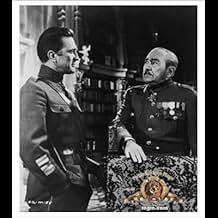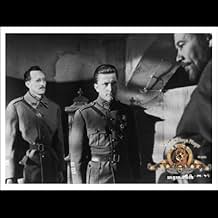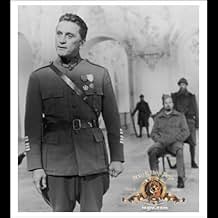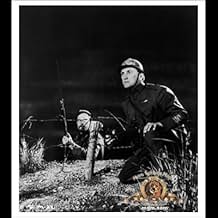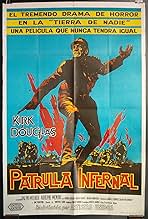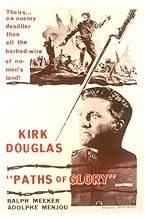Nachdem sie sich geweigert hatten, eine feindliche Stellung anzugreifen, klagt ein General die Soldaten der Feigheit an und ihr befehlshabender Offizier muss sie verteidigen.Nachdem sie sich geweigert hatten, eine feindliche Stellung anzugreifen, klagt ein General die Soldaten der Feigheit an und ihr befehlshabender Offizier muss sie verteidigen.Nachdem sie sich geweigert hatten, eine feindliche Stellung anzugreifen, klagt ein General die Soldaten der Feigheit an und ihr befehlshabender Offizier muss sie verteidigen.
- Nominiert für 1 BAFTA Award
- 5 Gewinne & 3 Nominierungen insgesamt
- Pvt. Pierre Arnaud
- (as Joseph Turkel)
- German Singer
- (as Susanne Christian)
- Capt. Sancy
- (Nicht genannt)
Zusammenfassung
Empfohlene Bewertungen
Kubrick displays a great control of sound effects and camera movement in the brief but effective battle scenes that expertly depict the controlled chaos that was trench warfare during WWI. Things get juicier during the ensuing courtroom battle where the deafening disparity between the elite who propagate and profit from war and the common citizens who suffer and die in war is shown with great lucidity.
Unlike later Kubrick epics, this runs at a crisp 90 minutes, though suffers briefly from a slow and awkwardly staged opening ten minutes before Douglas comes on screen. Ultimately, this holds up very well to modern scrutiny thanks to the flawlessness of Kurbick's craft, the amazing ensemble acting, and the surprising depth of its philosophical and psychological pondering. "Paths of Glory" is more anti-arrogance than anti-war, and is unapologetically sentimental and pro-soldier. As such, much can still be gleaned from its message.
This is a thought-provoking and intelligent war drama perfectly acted by strong cast and masterfully directed. Interesting screenplay based on a Humphrey's Cobb's novel has been well adapted by Stanley Kubrick and Jim Thompson . It depicts a brooding study about futility and insanity of war , making a shattering accusation against the military ruling staff who cares on promotions more than the soldiers . Kirk Douglas is very good as compassionate French Colonel who commands his troops in some spectacular scenes on the trenches . Stunning support cast beautifully performed by notorious secondaries , such as : Emily Meyer as the priest , Wayne Morris as the lieutenant , Richard Anderson as the Major prosecutor , Ralph Meeker , Timothy Carey , Joe Turkel and Suzanne Christian , Kubrick's wife . Special mention for the two selfish and ruthless Generals exceptionally performed by George Macready and Adolph Menjou . Excellent cinematography in black and white by cameramn George Krause , filmed on location in Schleissheim Palace, Munich, and Bavaria Film studios, Geiselgasteig, Grünwald, Bavaria, Germany (studio). The motion picture was wonderfully realized by the maestro Stanley Kubrick and lavishly produced by James B. Harris , his usual producer at the time . This magnificent film along with ¨ All quiet on the Western front ¨ , ¨Westfront 1918 ¨, ¨ Captain Conan ¨ and ¨King and country¨ result to be the best ones about the powerful antiwar theme . Time hasn't dimmed its power , or its poignancy and remains untouchable the critique to the military hypocrisy in an ultra-lucid exposition . Rating : 8.8/10. Phenomenal and marvellous film , above average . Essential and indispensable watching .
The setting is the Western Front of 1916 in the trenches with French soldiers faced off against an invisible German force across a barren No Man's Land. The German's are never seen and the dramatic "combat" is between vain French officers as they vie for prestige and honors. The victims are the innocent French soldiers under their command who suffer miserably because of their arrogance and ignorance.
Brilliant, gripping, and definitely a "must see".
In contrast to his previous picture, The Killing, a definite Kubrick style is beginning to emerge now. One notable example is the scene in which General Mireau tours the trenches, walking towards the audience with the camera retreating away from him. This technique would be repeated years later in Kubrick's other war film, Full Metal Jacket. There is also something about the arrangement of objects in the frame, as well the tracking and dollying which hints towards his more familiar later style. His recurring chess motif appears as well, albeit subtly. At the court martial the floor is chequered, and the soldiers on trial are seated with guards standing behind them as if they are pawns about to be sacrificed.
The light and contrast in this picture is put to good effect. The palatial officers' headquarters is light and airy with few shadows. The trenches are gloomy and cramped. Kubrick was becoming a real master at contrasting locations and getting the look of a place just right.
The use of music in Paths of Glory is bold and brilliant. The pre-recorded score is almost entirely percussive all rhythmic sounds with no melody. A weird kettle drum track is used to help build tension in the night patrol scene, while in the climactic scene the funeral march drumming instills a sense of dread, further heightened by having the shots edited in time to the beat. In the emotional final scene we get the complete opposite a beautiful vocal melody. This has all the more impact after hearing nothing but militaristic drums for the rest of the film.
The casting is absolutely flawless. While there are no big names apart from leading man Kirk Douglas and the now elderly Adolphe Menjou, there isn't a single weak performance. The despair and resentment of the condemned soldiers feels so absolutely real. In contrast the smugness and fake sympathy of the upper class officers is brilliantly portrayed.
Throughout his career Kubrick never seemed to be particularly keen on blatantly emotional moments. Paths of Glory is the exception. The later scenes are incredibly poignant and moving, and the final moments in the soldier's bar are what makes it a masterpiece more than anything else the icing on the cake. However it's quite probable that Kubrick regretted this as an overly sentimental approach, as woolly sentimentalism was a major gripe of his when he worked on Spartacus. Whatever the case, he certainly reined in the stirring stuff considerably after this, to the point where his later films became characterised by their understatement of emotions.
Wusstest du schon
- WissenswertesBanned in Spain under Gen. Francisco Franco's dictatorship for its anti-military message. It wasn't released until 1986, 11 years after Franco's death.
- PatzerCol. Dax commits a glaring military faux pas by jamming his hands into his pants pockets while standing and walking in the courtroom during the trial. No military officer would do such a thing, particularly in such a formal setting as a court martial.
- Zitate
Pvt. Pierre Arnaud: I'm not afraid of dying tomorrow, only of getting killed.
soldier in bunk: That's as clear as mud.
Pvt. Pierre Arnaud: Well, which would you rather be done in by: a bayonet or a machine gun?
soldier in bunk: Oh, a machine gun, naturally.
Pvt. Pierre Arnaud: Naturally, that's just my point. They're both pieces of steel ripping into your guts, only the machine gun is quicker, cleaner, and less painful, isn't it?
soldier in bunk: Yeah, but what does that prove?
Pvt. Pierre Arnaud: That proves that most of us are more afraid of getting hurt than of getting killed. Look at Bernard. He panics when it comes to gas. Gas doesn't bother me a bit. He's seen photos of gas cases. Doesn't mean anything to me. But I'll tell you something though, I'd hate like the devil to be without my tin hat. But on the other hand I don't mind not having a tin hat for my tail. Why is that?
soldier in bunk: You're darn tootin', because...
Pvt. Pierre Arnaud: Because I know a wound to the head would hurt much more than one to the tail. The tail is just meat but the head- ah, the head is all bone.
soldier in bunk: That's...
Pvt. Pierre Arnaud: Tell me this. Aside from the bayonet, what are you most afraid of?
soldier in bunk: High explosives.
Pvt. Pierre Arnaud: Exactly, and it's the same with me, because, because I know that it can chew you up worse than anything else. Look, just like I'm trying to tell you, if you're really afraid of dying you'd be living in a funk all the rest of your life because you know you've got to go someday, anyday. And besides...
soldier in bunk: Yes?
Pvt. Pierre Arnaud: If it's death that you're really afraid of why should you care about what it is that kills you?
soldier in bunk: Oh, you're too smart for me, Professor. All I know is, nobody wants to die.
- Alternative VersionenThe Criterion DVD version features the opening and closing MGM logos.
- VerbindungenEdited into Hai-Kubrick (1999)
- SoundtracksLa Marseillaise
(1792) (uncredited)
Written by Claude Joseph Rouget de Lisle
In the score during the opening credits
Top-Auswahl
Everything New on Prime Video in July
Everything New on Prime Video in July
- How long is Paths of Glory?Powered by Alexa
Details
- Erscheinungsdatum
- Herkunftsland
- Sprachen
- Auch bekannt als
- Patrulla infernal
- Drehorte
- Schloß Schleißheim, Oberschleißheim, Bavaria, Deutschland(Command Headquarter)
- Produktionsfirma
- Weitere beteiligte Unternehmen bei IMDbPro anzeigen
Box Office
- Budget
- 935.000 $ (geschätzt)
- Weltweiter Bruttoertrag
- 8.290 $
- Laufzeit1 Stunde 28 Minuten
- Farbe
- Sound-Mix
- Seitenverhältnis
- 1.66 : 1






